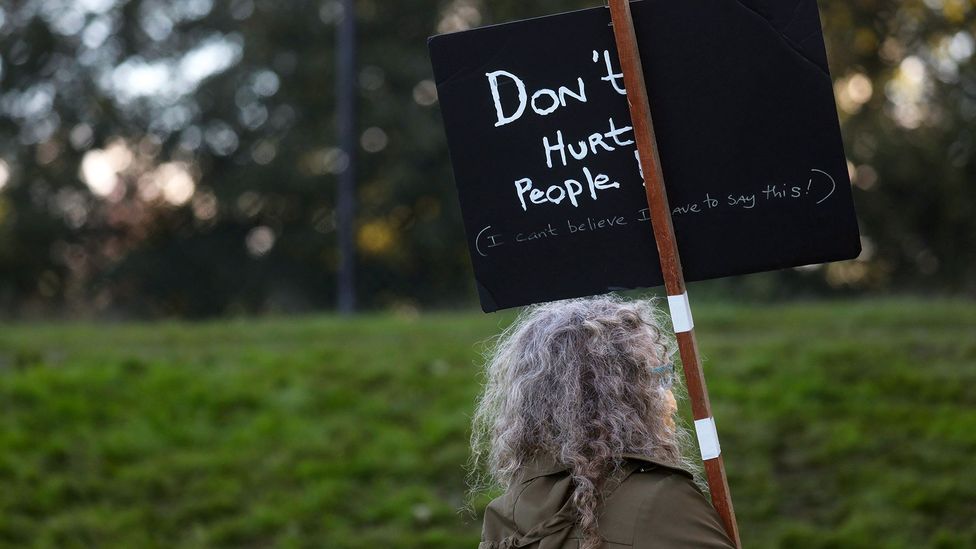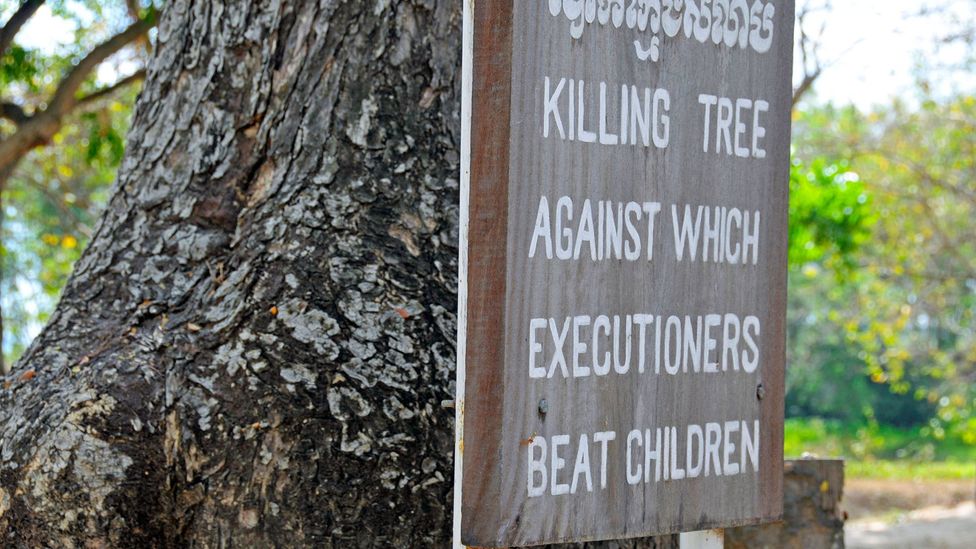Commercial With Baby Hyena Some People Know Whem to Pay More
Why some people are cruel to others

Inflicting harm or hurting on someone incapable of doing the same to you lot might seem intolerably cruel, but it happens more than y'all might think.
Why are some humans vicious to people who don't pose a threat to them – sometimes even their own children? Where does this behaviour come up from and what purpose does information technology serve? – Ruth, 45, London.
Humans are the glory and the scum of the universe, concluded the French philosopher, Blaise Pascal, in 1658. Trivial has changed. We dearest and we loathe. Nosotros help and nosotros damage. Nosotros reach out a hand and we stick in the knife.
We understand if someone lashes out in retaliation or self-defense. But when someone harms the harmless, we ask: "How could you?"
Humans typically do things to go pleasance or avert hurting. For well-nigh of united states, hurting others causes u.s.a. to feel their pain. And nosotros don't like this feeling. This suggests two reasons people may harm the harmless – either theydon't feel the others' pain or theysavor feeling the others' pain.
Some other reason people harm the harmless is because they nonetheless encounter a threat. Someone who doesn't imperil your body or wallet can all the same threaten your social status. This helps explain otherwise puzzling actions, such as when people impairment others who help them financially.
Liberal societies assume causing others to endure means we have harmed them. Yet some philosophers reject this idea. In the 21st Century, can we still conceive of being cruel to exist kind?
Sadists and psychopaths
Someone who gets pleasure from hurting or humiliating others is a sadist. Sadists experience other people's pain more than is normal. And they enjoy information technology. At least, they do until it is over, when they may feel bad.
The pop imagination assembly sadism with torturers and murderers. Yet there is also the less extreme, but more widespread, miracle of everyday sadism.

Near people would flinch from having to torture another human being, mainly because when we inflict harm on others, we share some of that pain (Credit: Alamy)
Thankfully, most people have no psychopathic traits. Only 0.5% of people could be deemed psychopaths. Withal effectually 8% of male and 2% of female prisoners are psychopaths.
Simply not all psychopaths are dangerous. Anti-social psychopaths may seek thrills from drugs or dangerous activities. Prosocial psychopaths, on the other hand, seek their thrills in the fearless pursuit of novel ideas. As innovations shape our societies, prosocial psychopaths can change the world for all of u.s.. Yet this still can be for both skillful and for ill.
Where exercise these traits come from?
No ane really knows why some people are sadistic. Some speculate that sadism is an adaptation that helped united states of america slaughter animals when hunting. Others propose information technology helped people to proceeds power.
Italian philosopher and diplomat Niccolò Machiavelli once suggested that "the times, non men, create disorder". Consistent with this, neuroscience suggests sadism could be a survival tactic triggered by times becoming tough. When certain foods become deficient, our levels of the neurotransmitter, serotonin, autumn. This fall makes us more willing to harm others considering harming becomes more pleasurable.

In that location are more mild forms of sadism that allow people to get a cheap thrill from someone in a vulnerable position (Credit: Alamy)
Psychopathy may also be an adaptation. Some studies have linked college levels of psychopathy to greater fertility. Yet others have institute the opposite. The reason for this may be that psychopaths have a reproductive advantage specifically in harsh environments.
Indeed, psychopathy can thrive in unstable, competitive worlds. Psychopaths' abilities brand them chief manipulators. Their impulsivity and lack of fearfulness assistance them take risks and take hold of short-term gains. In the film Wall Street, the psychopathic Gordon Gekko makes millions. Yet although psychopathy may be an advantage in the corporate world, it only offers men a slim leadership border.
Psychopathy's link to creativity may also explicate its survival. The mathematician Eric Weinstein argues, more generally, that disagreeable people drive innovation. Even so, if your environment supports artistic thinking, disagreeableness is less strongly linked to creativity. The nice can be novel.
Sadism and psychopathy are associated with other traits, such as narcissism and Machiavellianism. Such traits, taken together, are called the "dark factor of personality" or D-cistron for brusk.
In that location is a moderate to large hereditary component to these traits. And then some people may merely be born this style. Alternatively, high D-cistron parents could laissez passer these traits onto their children past behaving abusively towards them. Similarly, seeing others behave in loftier D-factor means may teach u.s.a. to human activity this manner. We all have a role to play in reducing cruelty.
Fear and dehumanisation
Sadism involves enjoying anotherperson's humiliation and hurt. Yet it is frequently said that dehumanising people is what allows us to be brutal. Potential victims are labelled as dogs, lice or cockroaches, allegedly making it easier for others to hurt them.
There is something to this. Research shows that if someone breaks a social norm, our brains treat their faces as less human. This makes it easier for us to punish people who violate norms of behaviour.
It is a sugariness sentiment to recollect that if nosotros see someone as human then we won't hurt them. It is also a dangerous delusion. The psychologist Paul Bloom argues our worst cruelties may rest onnot dehumanising people. People may hurt others precisely considering they recognise them equally human beings who don't want to suffer hurting, humiliation or degradation.

The Nazis dehumanised and murdered millions of people during the Holocaust at concentration camps (Credit: Reuters)
For example, the Nazi Party dehumanised Jewish people past calling them vermin and lice. Yet the Nazis also humiliated, tortured and murdered Jews precisely because they saw them as humans who would exist degraded and suffer from such treatment.
Do-gooder derogation
Sometimes people volition even damage the helpful. Imagine you are playing an economic game in which you and other players have the run a risk to invest in a group fund. The more money is paid into it, the more it pays out. And the fund will pay out coin to all players, whether they accept invested or non.
At the end of the game, you tin pay to punish other players for how much they chose to invest. To do so, you surrender some of your earnings and money is taken abroad from the role player of your option. In brusque, you tin exist spiteful.
Some players chose to punish others who invested little or cypher in the group fund. Yet some will pay to punish players who invested more than in the grouping fund than they did. Such acts seem to make no sense. Generous players give y'all a greater pay-out – why would you dissuade them?
This phenomenon is called "do-gooder derogation". It tin be found effectually the world. In hunter-gatherer societies, successful hunters are criticised for communicable a big animal fifty-fifty though their catch ways everyone gets more than meat. Hillary Clinton may have suffered practise-gooder derogation as a result of her rights-based 2016 U.s. Presidential Ballot campaign.
Do-gooder derogation exists because of our counter-dominant tendencies. A less generous player in the economic game to a higher place may experience that a more generous player volition be seen by others every bit a preferable collaborator. The more than generous person is threatening to become dominant. As the French writer Voltaire put it, the all-time is the enemy of the practiced.
Even so there is a hidden upside of practise-gooder derogation. Once we have pulled down the practise-gooder, we are more open to their message. I report found that allowing people to express a dislike of vegetarians led them to become less supportive of eating meat. Shooting, crucifying or failing to elect the messenger may encourage their message to be accepted.
Cruel to exist kind
In the flick Whiplash, a music teacher uses cruelty to encourage greatness in one of his students. We may recoil at such tactics. Yet the German philosopher Friedrich Nietzsche thought we had go as well averse to such cruelty.

Human history is marred with violence and cruelty against those who don't pose a threat (Credit: Alamy)
For Nietzsche, cruelty allowed a instructor to burn a critique into some other, for the other person's own good. People could also be savage to themselves to aid become the person they wanted to be. Nietzsche felt suffering cruelty could help develop courage, endurance and creativity. Should we be more willing to brand both others and ourselves suffer to develop virtue?
Arguably not. Nosotros at present know the potentially appalling long-term effects of suffering cruelty from others, including damage to both physical and mental wellness. The benefits of being compassionate towards oneself, rather than treating oneself cruelly, are also increasingly recognised.
And the idea that nosotrosmust suffer to abound is questionable. Positive life events, such as falling in love, having children and achieving cherished goals can lead to growth.
Teaching through cruelty invites abuses of power and selfish sadism. It isn't the only style – Buddhism, for example, offers an alternative: wrathful compassion. Here, nosotros act from dearest to confront others to protect them from their greed, hatred and fearfulness. Life can be vicious, truth can be cruel, simply we can cull not to exist.
* Simon McCarthy-Jones is an associate professor in clinical psychology and neuropsychology at Trinity Higher Dublin.
--
This article is function of Life'south Big Questions, a new series by The Conversation that is being co-published with BBC Future. It seeks to answer our readers' nagging questions about life, love, expiry and the Universe. We work with professional researchers who have defended their lives to uncovering new perspectives on the questions that shape our lives. If yous have a question you would like to be answered, please email either send us a message on Facebook or Twitter or email bigquestions@theconversation.com
--
Join one 1000000 Hereafter fans by liking u.s. on Facebook , or follow u.s.a. on Twitter or Instagram .
If yous liked this story, sign upwardly for the weekly bbc.com features newsletter , called "The Essential List". A handpicked option of stories from BBC Futurity, Culture, Worklife, and Travel, delivered to your inbox every Fri.
vanleuvenwaallovar.blogspot.com
Source: https://www.bbc.com/future/article/20201016-why-some-people-are-cruel-to-others
Post a Comment for "Commercial With Baby Hyena Some People Know Whem to Pay More"